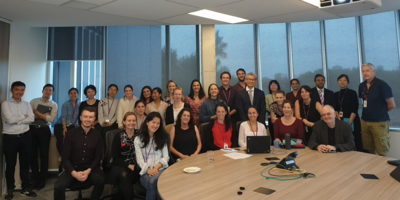
George Institute’s cardiovascular research receives government funding boost
An Institute-led project and two collaborative projects led by UNSW have received funding as part of $29 million for life-saving research initiatives announced this week by the Minister of Health, Greg Hunt, to tackle Australia’s two biggest killers – heart attacks and stroke.
This is the first round of the government’s 10-year, $220 million investment to boost research into heart disease and stroke through the Medical Research Future Fund’s (MRFF) Cardiovascular Health Mission.
Associate Professor Jason Wu has received $1.68 million to conduct a large-scale trial to assess the effectiveness of a new online shopping tool for those at high risk of heart disease and stroke due to high blood pressure.
The innovative online shopping tool will advise on grocery products to assist patients to select lower-salt options that will help with reducing their blood pressure and improving their heart health. If proven effective, this digital health technology tool could be delivered to large numbers of patients efficiently and at a low cost.
A/Prof Wu said: “One in four Australian adults have high blood pressure - one of the biggest contributors to premature death from stroke or heart disease - and too much salt in the diet is one of the major culprits. While reducing salt intake is strongly recommended by treatment guidelines, individualised counselling and support methods are highly resource intensive and have a limited effect.”
“Excess dietary salt is consumed largely from commercial processed and packaged foods - so innovative strategies are urgently needed to help people with high blood pressure to choose lower salt options.”
A/Professor Jason Wu will lead with a team of researchers from The George Institute for Global Health including Professor Bruce Neal, Cliona Ni Mhurchu, Mark Huffman, Fraser Taylor and Kathy Trieu.
The UNSW-led projects on which George Institute researchers will collaborate include a new app to help reduce re-admission of stroke patients to hospital and a new screening method to identify people at high risk of heart disease and stroke.
Professor Ken Butcher from UNSW Medicine and Prince of Wales Clinical School has received $1.62 million in funding for a new app-based care model that will remotely monitor vital signs using blue-tooth enabled peripherals, medication adherence and rehabilitation activities of patients who have had a stroke or mini stroke.
The project will be run out of UNSW affiliated teaching hospitals and selected regional sites in NSW via the NSW Telestroke Program, of which Prof. Butcher is the Medical Director. The George Institute’s Thomas Lung is an investigator on this project.
Dr Clare Arnott, Professor Anthony Rodgers and Mark Woodward will collaborate with Professor Louisa Jorm from UNSW’s Centre for Big Data Research in Health on a project that has received $1.46 million in funding to use digital health data already available for millions of Australians and will help those at risk of heart disease or stroke to take preventative action.








